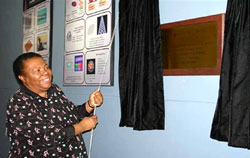Nanotechnology Education in South Africa: Coming of age?
News category: Nanotech
 Former Minister of Science and Technology, Minister Naledi Pandor officially opened the DST/Mintek Nanotechnology Innovation Centre in Sensors at Rhodes University in 2010.
Former Minister of Science and Technology, Minister Naledi Pandor officially opened the DST/Mintek Nanotechnology Innovation Centre in Sensors at Rhodes University in 2010.
This month in Nature Nanotechnology, a commentary by Rhodes University scientists on Nanoscience and Nanotechnology Education in the country provides some insight into how research, DST strategy, Nanotechnology Innovation Centres and organisations such as SANI and NPEP have helped shape a nanotechnology education in the country.
In an invited commentary, NRF Chair in Medicinal Chemistry and Nanotechnology, Distinguished Professor Tebello Nyokong and Professor Janice Limson, Head of Biotechnology at Rhodes, detail how research activities led the way ultimately for the curricula which have now emerged within the county’s Higher Education Institutions.
Central to that the authors state was the Department of Science & Technology’s National Nanotechnology Strategy projecting a ten year strategic framework for research and development in the sector. In collaboration with the DST, and driven to a large extent by the South African Nanotechnology Initiative (SANI), the Nanotechnology Strategy championed early on the growth in the research sector in Nanoscience and Nanotechnology. They argue in the article that it was ultimately the establishment of research programmes, a critical mass in researchers in the sector and a growing pool of postgraduate students, engaged in the field which led naturally to the establishment of a curriculum in HEI.
Crucially, for the development of research within the field was the access to targeted funding which became available through the Nanotechnology Strategy within the sector as well as the growth in facilities with nanotechnology equipment through the National Nanotechnology Equipment Programme for example. The establishment of DST funded Nanotechnology Innovation Centres as CSIR and at Mintek helped drive research and development in core focus areas. A case in point is Mintek which partners with institutions at Rhodes, UWC and UJ as research partners for future product development at Mintek. The success of this programme continues to be felt with the growth in graduates with nanotechnology and nanoscience skills to drive the future of the field in South Africa.
The authors make reference to the role of the nanotechnology community and activities by SANI in collaborative teaching programmes, pooling expertise in targeted education programmes. Initiatives such as the Masters in Nanoscience and Nanotechnology spanning UWC, UJ, NMMU and Wits is a remarkable example of such resource pooling in action as is the South African Nanoscience and Nanotechnology Summer School being held this week in Cape Town.
Such collaborations, either between universities or with industry or the science councils and the continued investment by government in targeted nanotechnology research and equipment funding cannot be overestimated in growing SA’s nanotechnology education and the promise of future life changing technologies.
The full article can be accessed at: Nature Nanotechnology 8, 789–791 (2013) doi:10.1038/nnano.2013.235
An education in progress. Tebello Nyokong & Janice Limson – Special Focus on Nanoscience education
Nyokong and Limson are based at Rhodes University (South Africa), host to the DST/Mintek Nanotechnology Innovation Centre in Sensors.
Link to full text: http://www.nature.com/nnano/journal/v8/n11/pdf/nnano.2013.235.pdf (Subscription only)
Writer: Janice Limson
